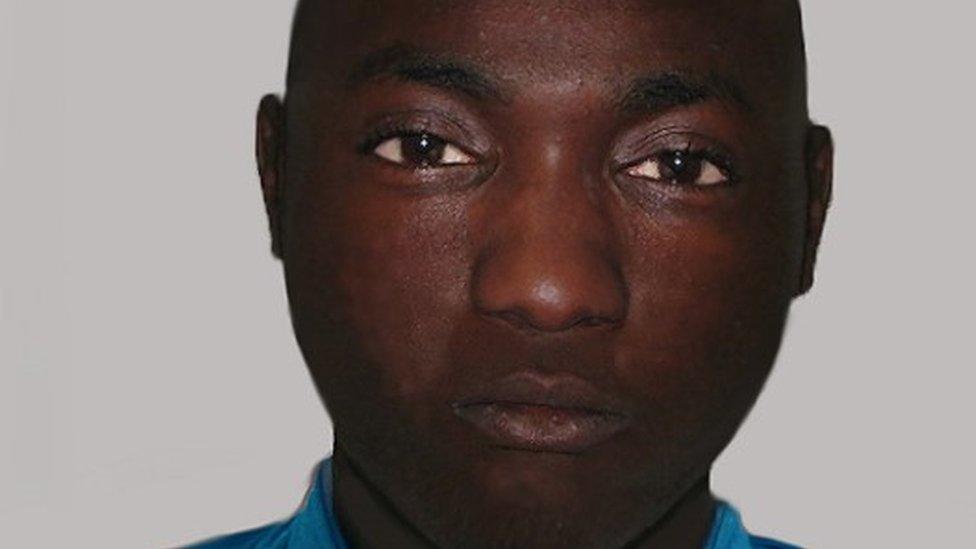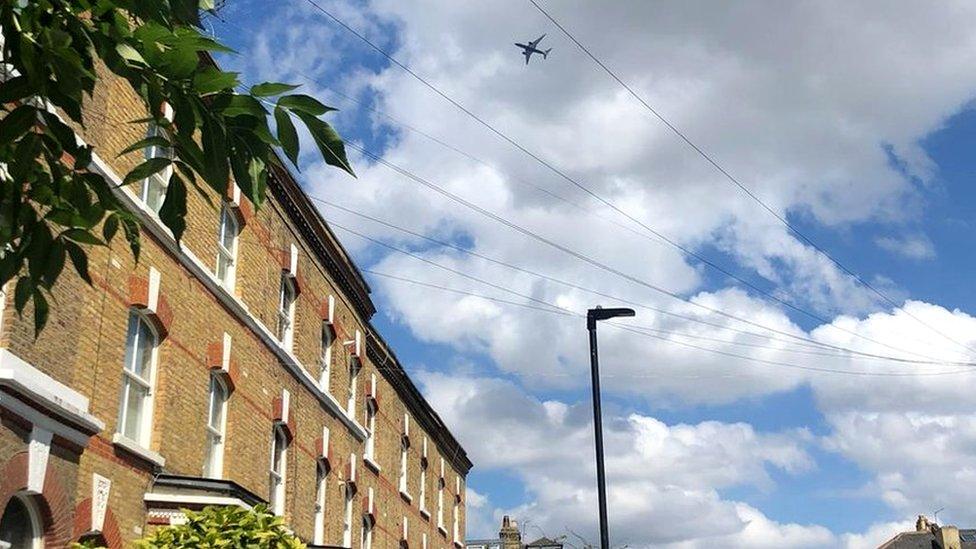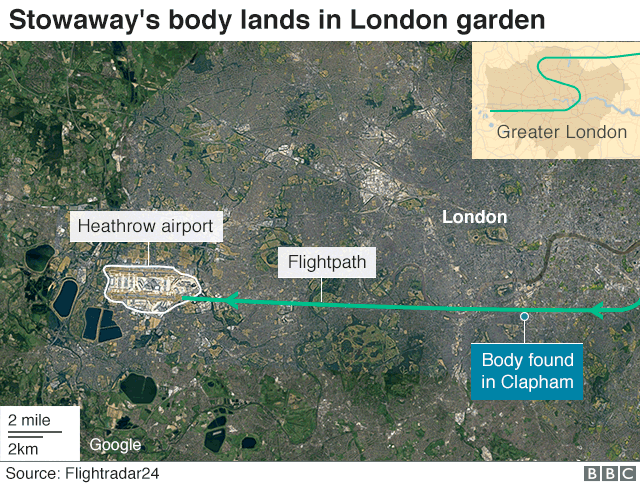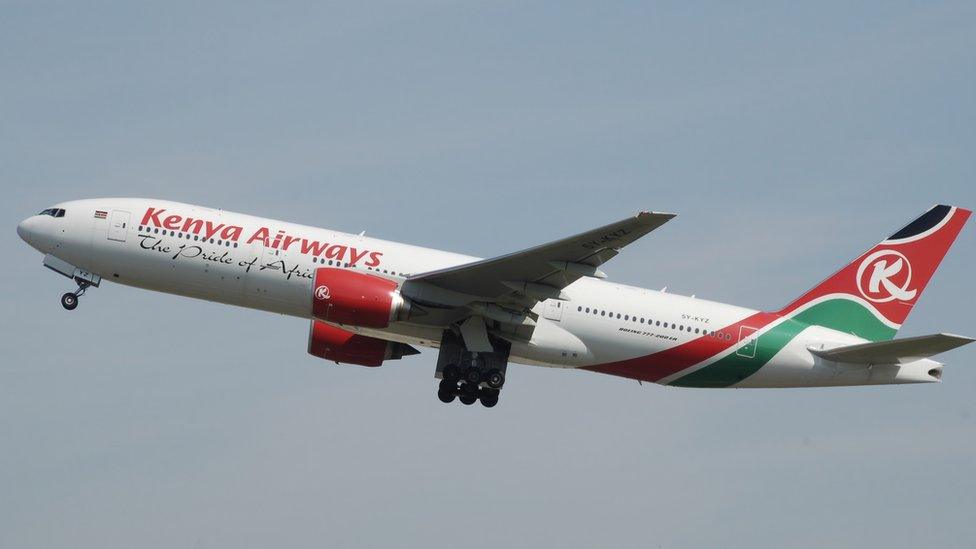Kenya Airways stowaway: Mystery of the man who fell from the sky
- Published

An e-fit of the stowaway
The identity of the man who fell from a Kenya Airways flight headed for Heathrow Airport, London, in June remains unknown.
An investigation by British broadcaster Sky News this week appeared to have confirmed the identity of the stowaway, who is believed to have hidden in the plane's landing gear, however several questions have since been raised.
The Sky News report identified the man as Paul Manyasi, external, who it said worked for a cleaning services company contracted to work at the Jomo Kenyatta International Airport in the Kenyan capital, Nairobi.
Kenyan authorities have disputed the report, saying the man named in the report is not the dead stowaway.
Prison authorities have told the BBC that the man shown in the photos by Sky News is actually Cedric Shivonje Isaac, who is alive, and has been in their custody for three months for an unrelated criminal offence.
Government spokesman Cyrus Oguna told the BBC the report was "fake news".
"This is an open investigations and I can say the report is what you call fake news. The family of Cedric [Shivonje] hasn't been barred or refused access to him. You can see this is clearly someone different. So let our investigative arms do their job," said Col Oguna.

The man's body fell into the garden of a house in London
The government spokesman's comments appear to align with the statement by the man who initially told Sky News that Paul Manyasi was his son, but has since retracted his comments.
The man reportedly insists he knows no-one by that name and insists that his son is Cedric, who is alive.

You may also be interested in:

Cedric Shivonje or Paul Manyasi - who's who?
So who is Paul Manyasi, the man who is named by the Sky report? Could it still be the name of the actual stowaway? Is it a case of mistaken identity? Could it be a cover-up by Kenyan officials? And who is Cedric Shivonje Isaac?
The latter name came to light after the purported father of the stowaway was interviewed by Sky News, only to retract his statement a day after the investigation aired.
Issac Beti claimed his son was alive and his name is Cedric Shivonje Isaac, who was being held in police custody.
The BBC has corroborated this information and has also learnt that investigators have now questioned both the family and Cedric in prison, as they try to establish what links if any, he has to the individual named in the Sky report and the stowaway incident.
Where do stowaways hide on planes?
As to who Paul Manyasi is, we don't know much more than what Sky News reported - and which is disputed by Kenyan officials.
Both the Kenya Airports Authority (KAA) and Colnet, the cleaning company which he was said to have worked for, have issued statements saying they are not aware of anyone by that name, and in particular that a security pass has never been issued to a Paul Manyasi.
So the identity of the stowaway is still unclear. There is a possibility that there is more to this than meets the eye.
Is it a cold case or cover-up?
Until the Sky News investigation, Kenyan authorities had largely remained mum over the case, which they call an "open and active investigation."
Numerous BBC requests for information from various security agencies have been met with "no comment" or a referral to a different agency.
The BBC has so far established that a multi-sectoral security team is heading the investigations but not much ground has been covered.
There is no explanation as to how the stowaway accessed a high-security area like the airport.
Both KAA and the police have refused to confirm if all airport staff and all employees of companies contracted to work at the airport have been accounted fo.

If all the staff have been accounted for, it would point to an outsider who easily accessed three layers of security checks to gain entry into the plane.
If this is the case, it is an embarrassing security breach for a country that just received a Category 1 classification to fly directly to the US.
The UK Metropolitan Police has also now confirmed that they shared fingerprints taken from the stowaway's body with Kenyan counterparts, who have until now failed to find a match.
This is surprising, given that all Kenyans who are 18 years and above have to have their fingerprints taken before being issued with an identity card, which is mandatory.
Kenya Airways' unanswered questions
Aviation experts have told the BBC that the Kenya Airways pilot who flew the plane should clarify if he conducted the laid down pre-flight checks before it took off.
In fact, soon after the incident, the director-general of the Kenya Civil Aviation Authority, Gilbert Kibe, told the BBC that it is indeed what normally happens.
"'They do check every part of the airplane, including the undercarriage, the wheels, the brakes, the tyre condition, the wheel well that is above there. They inspect everything. So when those checks were being done, it is not likely that person was there, otherwise he would have been seen."
Gilbert Kibe: "Whoever it is most likely had access to the airside"
So at what point did the stowaway enter the plane? And did the pilot breach the laid down security protocols?
If so, this could prove to be a huge blunder for the airline which is fighting hard to return to profitability after years of losses.
Why the incident poses a risk for Kenya
Insiders have told the BBC that the case potentially has huge national security ramifications as the country wants to protect its Category 1 status.
The US Federal Aviation Administration and the Transport Security Administration regularly conduct reviews of the status, according to guidelines laid out by the International Civil Aviation Organization.

The stowaway case could potentially affect direct Kenya-US flights
This normally "focuses on a country's ability, not the ability of individual air carriers, to adhere to international aviation safety standards and recommended practices".
If the US authorities were to deem the incident and the investigations as wanting, and downgraded Kenya, the country would not be able to open new routes to the US or code-share with American carriers.
Kenyan aircraft would also go through much more thorough checks at US airports.
This could have a significant effect on the tourism and horticulture industries - sectors that Kenya has identified as important for its economic growth.